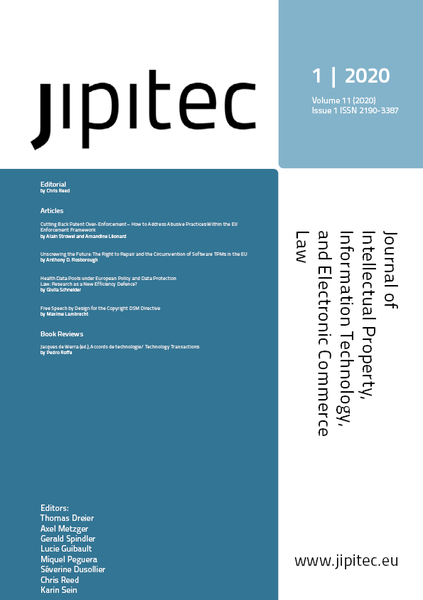Cutting Back Patent Over-Enforcement – How to Address Abusive Practices Within the EU Enforcement Framework
Keywords:
Abuse of Rights, Article 3(2) Enforcement Directive, Directive (EU) 2004/48, Entities; Patent Trolls, Flexibility and Injunctive Relief, Patent Assertion, Patent litigation, ProportionalityAbstract
The debate over the degree of flexibility at the disposal of national courts in Europe to grant, deny, or tailor, injunctive relief in patent litigation seems to be a never-ending story. In most jurisdictions, absent exceptional circumstances, findings of infringement lead national courts to grant, quasi-automatically, an injunction. However, some scholars as well as industry players, have argued that in light of recent changes in litigation behaviour as well as technology developments, a general principle of proportionality should play a more prominent role vis-à-vis injunctive relief. It is in particular with reference to Art. 3(2) of the Enforcement Directive that such claims have been made. If UK courts have been inclined to consider that, under certain circumstances, a balance of interests may take place before granting a permanent injunction, German courts on the other hand have firmly stood on the ground that the principle of proportionality should not interfere with the right of patent holders to obtain such remedy. However, most recently, the German Ministry of Justice published a draft amendment to the German Patent Act providing some guidance on the role of proportionality vis-à-vis the rules of injunctive relief. The issue of flexibility and injunctive relief is symptomatic of a broader debate regarding potential over-enforcement practices by right holders and the means to overcome or reduce the negative effects of these practices. Overall, this article examines how the origins and justifications of the Enforcement Directive, which focus on fighting piracy and counterfeiting, may affect the applicability of the principle of proportionality in the ever-changing context of patent law. How national courts have (or have not) relied on different mechanisms to infuse more flexibility in case of over-enforcement practices by right holders. And finally, how the principle of proportionality as well as the principle of the prohibition of abuse of rights may serve national courts in this endeavour of limiting excesses in patent litigation.Published
2020-04-01
Issue
Section
Artikel

